2023 is a landmark year for Iceland’s CCP Games. The developer is celebrating two decades of EVE Online, the spacefaring MMORPG that stands apart as a phenomenon in the games industry. It’s part of just a select number of longstanding multiplayer experiences that have stood the test of time.
In salute of this major milestone, CCP hosted a very special Fanfest convention in Reykjavik back in September, and The Nerd Stash was invited to attend. There, we saw its passionate fanbase cheer for a slew of new content drops during a packed keynote, which included the Havoc expansion and exciting FPS spin-off Vanguard. But the highlight of the experience was absolutely the opportunity to speak with the company’s founder and CEO, Hilmar Veigar Pétursson.
In a fascinating 30-minute conversation, Pétursson spoke candidly about the challenges of developing EVE Online over the past 20 years from a small volcanic rock in the North Atlantic.
EVE Online Interview With Hilmar Veigar Pétursson
Managing Editor Alex Gibson: It was amazing to see Iceland’s president on stage today. It was a reminder of just how successful CCP has been and its significance. What do you hope that CCP means to Icelandic people?
Hilmar Pétursson: So, Iceland is a nation of storytellers. We were writing sagas on calf skins a thousand years ago, which was the way Icelandic sagas are written. Now we have Halldór Laxness, a Nobel Peace Prize winner, and there are people like Bjork who is really like a storyteller through music. You can look at EVE in the way of a story framework. It’s like an operating system for people to make their own stories.
There is this kind of new way of telling stories through technology and art and many other disciplines involved, but it is in a way a form of narration. Books, music, movies, and even calf skins are good ways, but computer games in my opinion are even better because then the story becomes interactive. The people become a part of the story. You can’t change a movie or music, but a game, especially a sandbox game like EVE Online, is of your own making. You are making your own adventure.
Because EVE is so unique and it’s made by half Icelandic people and half people who came to Iceland, I know that for a lot of people here in the Icelandic gaming industry, it is an inspiration. They feel as though we have a voice in this which is also a massive industry; computer games now exceeded all other forms of entertainment by a mile.
My hope is that we can serve as an example that we have a good chance of doing something meaningful in this vast industry because Iceland is not a big country. Big outcomes in computer games translate into massive outcomes for small countries.
In my opinion, a game developer is what you would want to see in your economy. It’s fun to do. It requires a lot of people involved; making games is hard. It’s an intellectual and creative endeavor. If I look at my kids, what would I like them to do? I feel making computer games is a very worthwhile pursuit, even if I’m not forcing it on them, per se. And they’ll probably rebel against me, anyway!
I think it serves as an inspiration that our natural instinct for storytelling and our thousands of years of doing that have a voice in this new medium that is, computer games.
Have there been challenges developing in Iceland or has it even in some ways benefited the game to be stationed here?
Hilmar Pétursson: It’s both a challenge and an opportunity. The team that delivered EVE Online has never made the game before, almost to a point where we have never seen a game developer from afar. As a consequence it’s different. It’s almost in its own genre. Are there other games like EVE? I don’t really know.
The con is that the talent pool is very small. So we have had to improve talent in Iceland, which requires fighting people who wanna move to Iceland. And it’s not a given, even though it’s easier now than it was because Iceland has become a phenomenon, frankly, when it comes to tourism.
How has it changed over that time?
Hilmar Pétursson: It has changed massively. When we were talking to people that we wanted to recruit and come and move to Iceland, you could see it in their eyes. It was like a science fiction idea, whereas now it’s like “Oh, Iceland that’s cool! Count me in.” It’s way easier than it was — like, Iceland really has to put itself royally on the map through tourism and also through I mean there are many success stories such as myself, too. In the hi-tech industries on a per capita, we hold some record in it. Actually, just for a perspective: one and every one thousand people works for CCP!
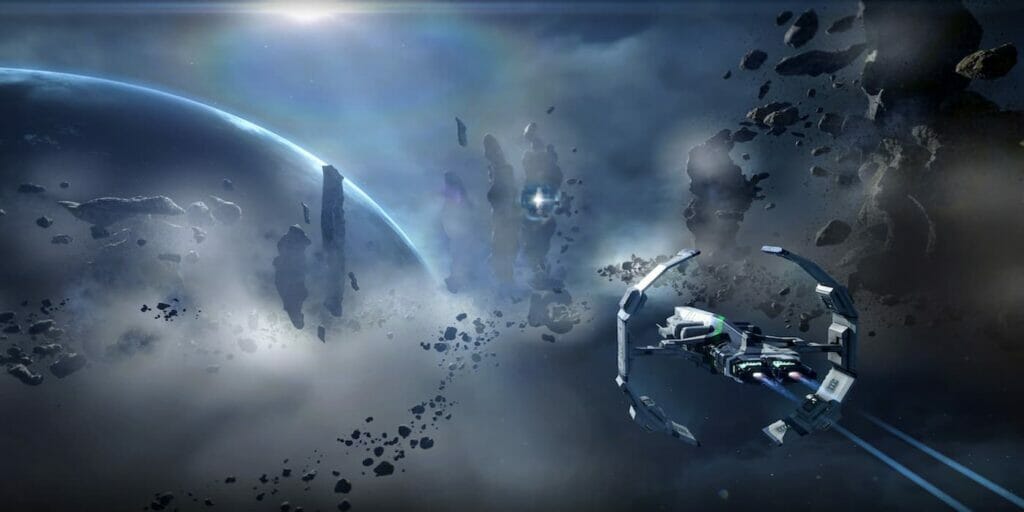
I thought it was quite fitting when I was flying as my first time in Iceland that it does look very otherworldly. The landscape is like landing on a different planet. Did you draw any inspiration from the sort of geography of Iceland when you were thinking about EVE?
Hilmar Pétursson: Not consciously, but unconsciously. Obviously, many people call this out; EVE players come to Iceland and describe it as like coming to New Eden. They call out things about Iceland they see in the game. It is clearer to them than to us. When you are brought up in an environment you don’t always know where your inspiration and intuition comes from. But Iceland is a dangerous place. The country itself is out to get you. There are earthquakes, there are volcanoes, and there are gale-force winds. It’s a it’s a vicious place. Yeah, the people are cute, but the country is terrible. And it’s not like animals in the country; it’s literally the actual environment. Similarly, New Eden is like that. It is not a cozy place.
With respect to where EVE Online is at today, are you happy with its overall state? For example, is the game’s player base at a healthy number, and do you feel like the depth of content that you offer players is what you had envisioned ten years ago when you were celebrating breaking? Has this exceeded your expectations?
Hilmar Pétursson: So, it exceeded our initial expectations. I would have these dreams before release where five years and a hundred and fifty thousand people? Now we’re 20 and 50 million or something, so I mean we smashed the initial goals, but along the way, we also learned that it just isn’t a game, really. It’s more like an imaginary city or something…
Alex: A meta-verse?
Hilmar Pétursson: Yes, though I would have used that word 10 years ago. Now it’s been worn out. I’m in a mixed relationship with the word! Our aspirations for EVE Online are informed by these twenty years. So now I’m more in this sort of I’m torn between. It is obviously amazing that we’re here celebrating twenty years and everyone is like “f**k yeah!” for the third decade. I mean that is amazing. You could see how everyone was ready for it in the audience. On the other hand, it could arise to so much more… whatever — more relevance, more impact, more growth for the people participating in it. So I am in this sort of conflict between it could still be so much more even if it is already amazing. So I live in this tension but it could become what it is.
Alex: What are the what are the main barriers to achieving what it could become? Are you referring to technological obstacles?
Hilmar Pétursson: No, I actually think it is largely us who are developing it. We just need to become better at it. We are holding it back. It’s not like we’re doing a bad job. It is unprecedented to even be talking about these things, so we’re always charting a new power every year of the passes, but if we become better after taking care of it, it will become better. And then eventually it needs to get to a place where our agency in it reduces. It just becomes so powerful on its own that it’s going to exist regardless of our ability to take care of it.
Alex: And how challenging is it to develop content that satiates all of these veteran players who have been playing for 20 years, but then you’re also providing a kind of incentive for new people to get on board because it’s such a hardcore experience. Is it really difficult to find that balance?
Hilmar Pétursson: Yes, it is difficult. It’s very much like developing a city or a country. There are many different constituencies. They all have different needs. Some of the needs are in conflict with each other, so you have to pick and choose. It’s not obvious what the right answer is, so you’re gonna be wrong plenty of times. Either going to be paralyzed and do nothing because you’re worried about being wrong, or you just have to deal with the fact you’re wrong half the time and right half the time, and that is tough, especially when we have an extremely personal player base that told us to a very high standard where we should do no wrong. We should just do the right things right. I know especially kind of the culture, and then today often is a bit daunting when people are starting at CCP and you’re faced with people that have been playing in this game for 20 years and you’ve just started. It’s a bit of an intimidating position, but it’s like a challenge of taking care of a social construct – whether it is a city or a country.
When you have hundreds of thousands of people with passionate opinions about how their place of existence should be, it’s just going to be a challenge. It’s not going to be. It is not obvious what is going to be the answer.
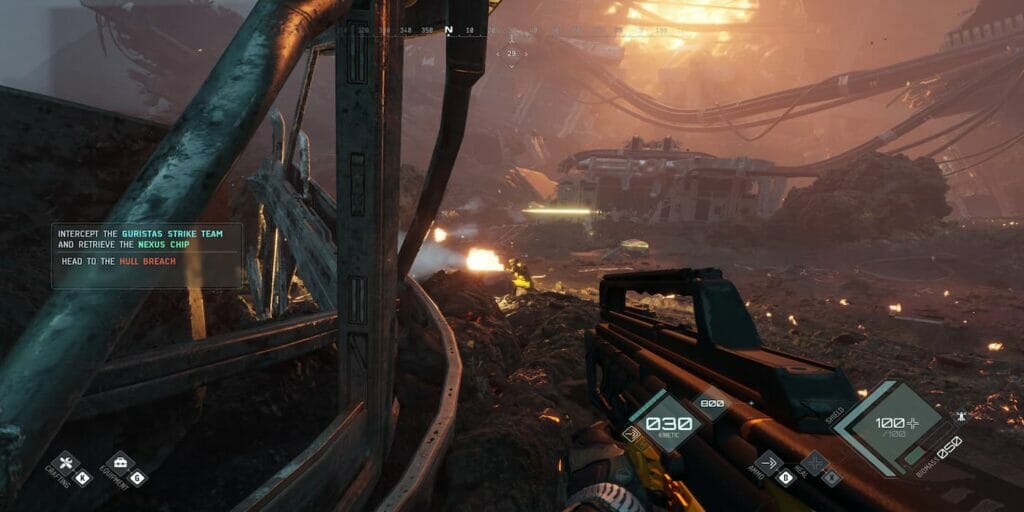
Alex: Do you worry that spin-offs like Galaxy Conquest and Vanguard, which are presumably targeted at drawing new players, will upset veteran EVE fans?
Hilmar Pétursson: I think a lot of what we do in EVE and outside EVE are alternate ways to play the game. When we have something like wormhole space, it’s a new way to play the game. When we have something like planetary interaction, it’s a new way to play the game. With Galaxy Conquest, it’s a new way to experience the IP.
And then we have something like Vanguard, which is in a very interesting space in between, both a new way to participate in the overall economy context of EVE Online and the social economy context. It’s also a very different experience because you’re not in a spaceship anymore. We’ve tried that many times and that is hard to crack because it’s unprecedented. Again, nobody has done that before. It’s even to the point that not many game devs have an economy where it makes sense to do that. For us, that comes from the single-shard server, where the whole economy is contiguous across all experiences. In that instance, it does make sense to add modules to it.
But if you already have a charted economy or a session-based economy or character-persistent economy and not a world-persistent economy, it doesn’t really make sense to add these things. You’re not really connecting anything to anything. So, we want to figure that out. We’ve certainly taken many shots on target – not all have been home runs – either within EVE or outside EVE also not everything we do with EVE is a home run. But this one is informed of literally more than a decade of several shorts on target.
Alex: What was the conversion right? With Dust 514 and people kind of coming from that experience to EVE did? Was there was there a big surge in player numbers after that launch?
Hilmar Pétursson: So, there was more of a halo effect of it than a conversion effect of it. There was a conversion effect, for sure, but the halo effect was way bigger. When Dust came out people were more interested in EVE. And this idea of the halo effect is well-researched; for example, when Apple made the iPad the Mac started to sell more, which doesn’t make any sense. The iPad is in a way entitled to competition with the mark, but the reverse happened
So it is it’s a well-understood social phenomenon that the halo effects are very strong, so we saw a surge in interest in EVE Online because of the existence of Dust. We also saw people funnel through dust and into EVE, but that effect was smaller than the effect of the grander idea manifesting.
Alex: Do you ever worry that you’ll upset current players by pushing development in the direction of something like an fps game which is not an audience with EVE’s standard experience, but it’s very, very different?
Hilmar Pétursson: Yeah, so again to the political situation. You will please some of the people some of the time, some of the people all of the time, all of the people some of the time, but not all the people all the time. And that’s just it. You can’t please everyone all the time, and if you do that you end up doing nothing, so it’s better to do something than nothing. It’s better to have an educated guess about like why you’re doing this, or at least a hypothesis says then at least you can be wrong and then you know where you’re wrong. Worrying about upsetting people gets you nowhere.
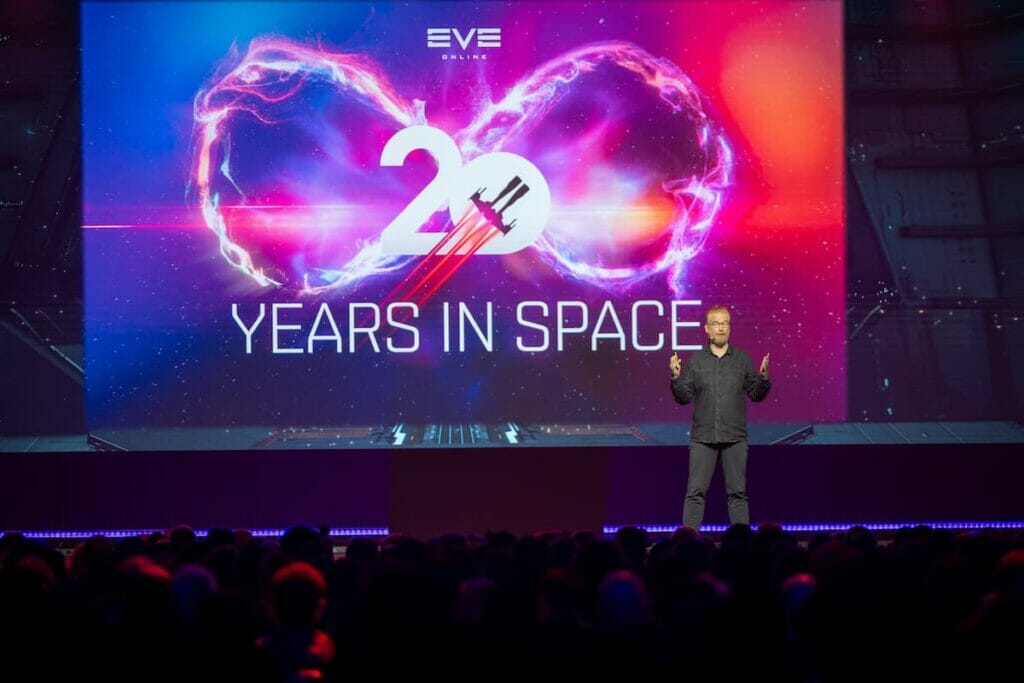
Alex: Were you happy with the reception on the stage?
Hilmar Pétursson: I was so happy with the reception. And I’m very happy, especially, for having seen CCP Snorri on stage with an image of Dust in the background. That was, like… that gave me goosebumps. That was a moment that gave me chills.
Alex: How did the pandemic affect the development of EVE did you see and also the play account as well? Did you see a surge in popularity for the game when people were sort of started?
Hilmar Pétursson: Yes, a massive surge. I think we saw a 30% increase. Wow okay in new players people come back and revenue, pcu, and any metric was 30% up. Massive challenge doing the game from home. We are not as strong as EVE players fighting international galactic warfare from home yeah for twenty years. We are not training for that as much. They put us to shame! We did okay, like anyone. I think my conclusion would be productivity went up, creativity went down.
Alex: I suppose people are not as collaborative when they can’t see each other?
Hilmar Pétursson: Yes, there’s a lot that happens in the gap between the plants and what comes out of the serendipity of people coming together and bumping against each other.
The output is the same, but creativity is not the same. You can see as soon as we got to an office and you look at the first expansion was Uprising, and then, “Okay, yeah, this is how it should be!” I’m not saying it could be done from home, but we were obviously not as good from home as we were in our office
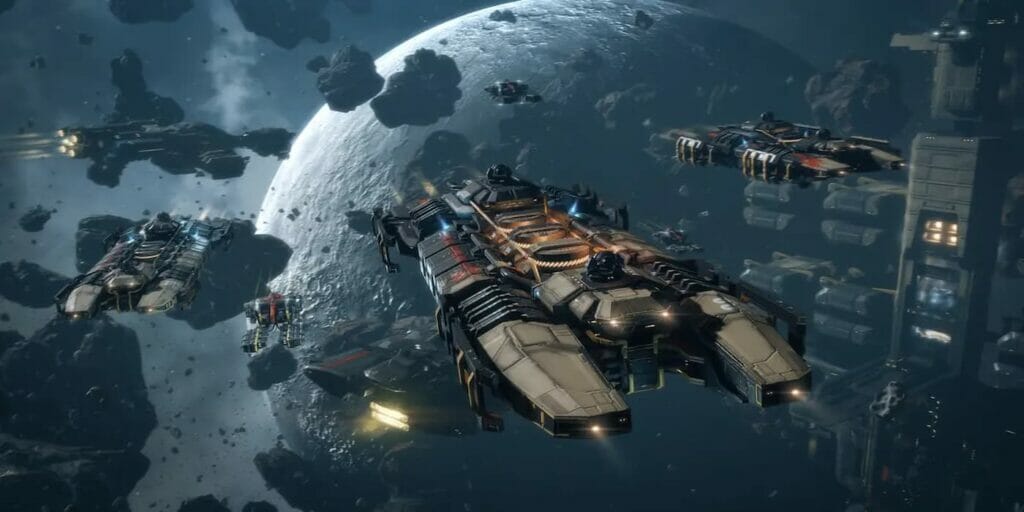
Alex: Has become more common for members of the team to work from home. Now following the pandemic used to offer a kind of hybrid approach to work off the back of that was it very much once you were allowed to come back into work…
Hilmar Pétursson: Officially, we have a hybrid policy. Largely in Iceland in Shanghai people just come to the office. It’s kind of mixed in London right now.
The London team also grew up more in the condition of the pandemic. In London, the pandemic was a bigger feature, proportionally. In Iceland and Shanghai were very much in offices during that time, so maybe that’s a factor. People largely come to the office. I would say the work-from-home is now more like a tool in the tool chest. It does happen that people work from home, like sick children, something going on, etc. I think it is like a flexibility tool that is now in the tool chest more officially than before. I think that’s generally a good thing. Flexibility is a good thing. But especially here in Reykjavik, there is really no commute. The office is amazing. Why not come in?
Alex: The player surge that you saw during the pandemic; have those players largely stuck around? Or did you see a sort of drop-off over that time?
Hilmar Pétursson: No, it did reverse. I think once the lockdown lifted people were just really in the mood to come and touch the grass. If you think that we were all there and we saw that in the numbers like the, there was like I know, and then there was a town and then it kind of reached an equilibrium, but there were for sure people wanted to test grass in. I don’t know. Summer 21, Summer 22.
Alex: What are the daily player counts for EVE?
Hilmar Pétursson: I think our monthly active user base across all formats is about 1 million. And that’s mobile, EVE China, etc, all the various versions. Monthly Active Players are 1 million across them.
Alex: And that’s a number that you’re happy where there’s you still move into this third decade, that fills you with optimism for this next phase of the game’s development?
Hilmar Pétursson: I think it’s less about the numbers, per se, and more about the engagement. I mean, this is the biggest fanfest and people have been very happy for twenty years. Of course, that’s a bit of a feature (the anniversary), but I think we’re representing good stuff, and we’ve been delivering good stuff in the most reason expansions. I think that is more that is more of a leading indicator than the lacking indicator.
How many people are playing right now doesn’t really matter for the future. What matters is what you do; how many people are playing right now informs very little in a way. We can always increase that if we do the right thing. EVE is not going out of fashion. It’s innovative beyond measure; there’s nothing like it. If we continue to make it better, it will be enjoyed by more by more people. It’s really just on us. It’s not really on how many people are playing it right now
Alex: How has development changed over the past 20 years? Specifically, in more recent years with how the team operates.
Hilmar Pétursson: You could write an MBA on that. There’s probably a five-year cycle of refining development processes, structure around projects, etc. We did the whole kind of scrum and agile phase. Then we wanted to scaled-scrum. I think we’re now wearing it’ about sort of outcome-driven development team topologies. These kinds of things are big themes in the development culture of software overall.
I think we have learned about the shortcomings of scrum-and-agile. Certainly, dogmatic adherence to it does not seem to be a good path. I think actually dogmatic adherence to anything is not really a good plan! Topics are now outcome-driven development, team technologies, etc. There’s a lot about testing production, attitudes around microservices; there’s a lot of these sort of technical nitty gritty things. How teams become units that interact with each other, reducing overhead, improving coordination dependent, etc.
Alex: Is that all based on your own experiences? Or do you sort of outsource any advice? Do you look at how other companies are operating at
Hilmar Pétursson: All of the above. It’s informed by our own experiences for sure, and mostly that. It’s informed by new people coming into CCP with new ideas factored in, and informed by the best practices in the industry – which is ever-changing.
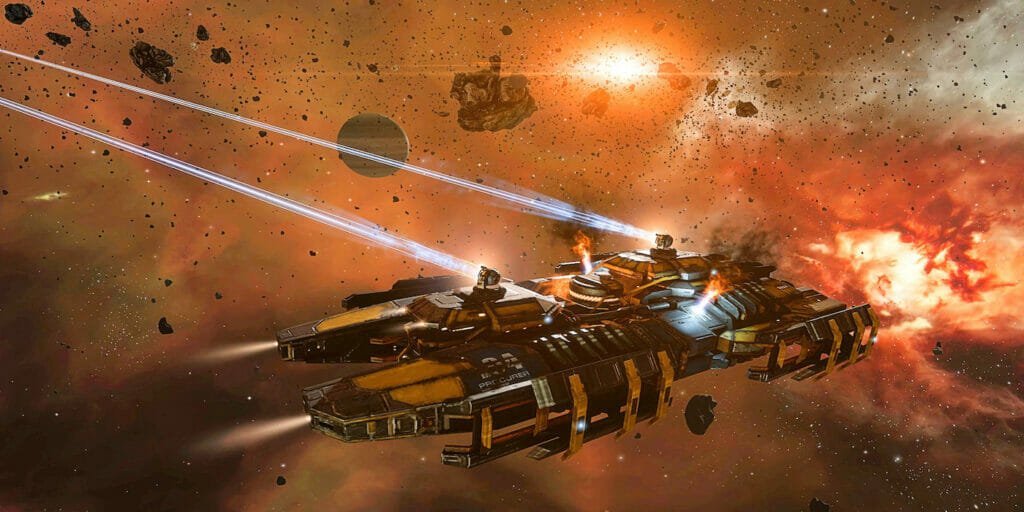
Alex: What do you feel is different about CCP for aspiring young game developers if they were looking at coming to work here?
Hilmar Pétursson: CCP is a little bit like EVE Online. It’s a bit of a sandbox. So, if that excites you — to do something very different in a very different way, and you can progress through that in a different way, then CCP Is very much a place for you. If you’re looking for something more structured and spoon-fed, then this is not the place for that.
I think you can generally look at the products of companies and they are an expression of the culture. So what you see in EVE is what you see at CCP — minus the betrayal!
Like the president was saying: splitting skulls! There’s less of splitting skulls! The beautiful kind of conundrum about EVE is that people who have such exposure to so much violence in skullduggery in their hobby seem to be extremely well-adjusted and open in reality because the violence is left on the screen.
And like EVE, players are just like I don’t know they’re magical beings to me. Every single player I have met has always been awesome. But every single EVE player I interacted with through the internet seemed to be like, okay, we’re not in politics here. I learned the dichotomy of those two things, and I think CCP is a little bit like that. If you meet your already player in person like the CCP influence is not far out of the field.
There is something to the notion that if you have so much outlet for expressions of these things working on EVE is a little bit like a plot spot like playing. You’re interfacing with some of the smartest, most conniving strategy, gritty humans on earth and you’re trying to have an opinion that is almost above theirs. “No, no, this is not really what you need. You need this thing over here!” That takes a lot, so if you’re excited by that, then CCP is for you. If you are not, then maybe not.
Alex: Well, Hilmar, thank you so much for speaking with me today. It’s been an absolute pleasure.
End.







